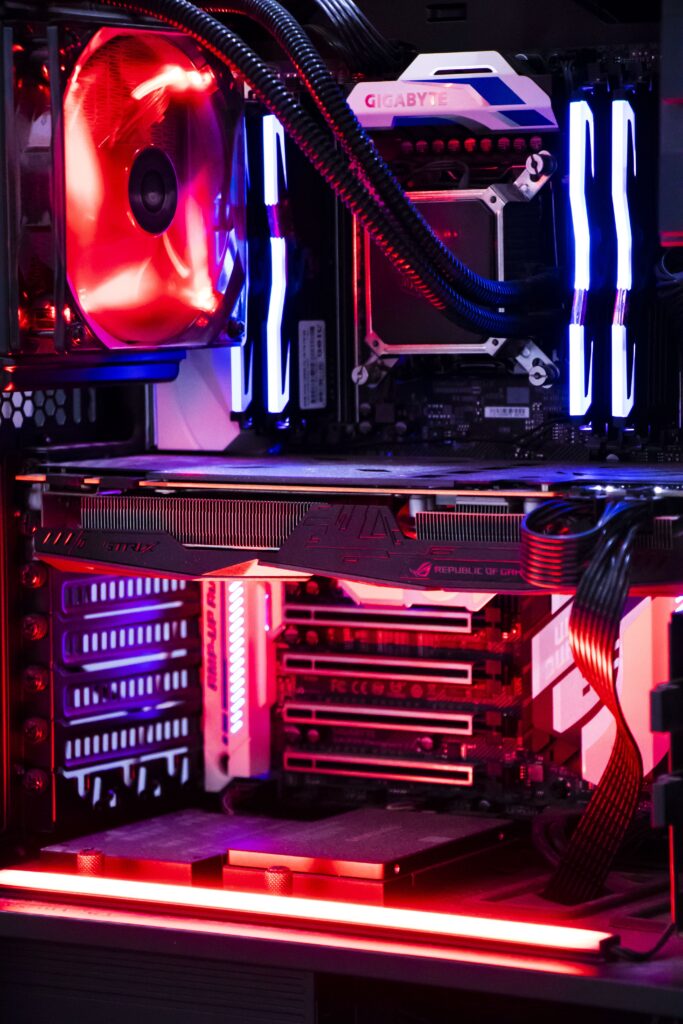Imagine sitting down for a gaming session with your friends, fully immersed in the virtual world. The adrenaline is pumping, the excitement is palpable, and then it happens – your wireless gaming controller lags, throwing off your game. Frustrating, isn’t it? In this article, we will explore the topic of wireless gaming controllers and their responsiveness compared to their wired counterparts. Are wireless controllers truly able to keep up with the demands of fast-paced gaming, or is it better to stick with the tried and true wired ones? Let’s find out.
1. Introduction
Gaming controllers are an essential tool for any gamer, providing a means of controlling characters and interacting with virtual worlds. When it comes to choosing a gaming controller, one of the key decisions to make is whether to opt for a wired or wireless option. Both types come with their own set of advantages and considerations, so it’s important to understand the differences between them. In this article, we will explore the various advantages of both wired and wireless gaming controllers, delve into the technology behind wireless controllers, discuss latency issues, compare response times, and provide some factors to consider when choosing between the two options. By the end, you’ll have a clear understanding of each type and be able to make an informed decision about which gaming controller is right for you.
2. What is a gaming controller?
A gaming controller is a device used to input commands and control the movements or actions of characters in video games. It typically consists of buttons, triggers, analog sticks, and other input mechanisms that allow gamers to interact with the game. Gaming controllers come in various shapes, sizes, and designs, depending on the gaming platform and individual preferences.
3. Advantages of wired gaming controllers
3.1 Low latency
One of the key advantages of wired gaming controllers is their low latency. Latency refers to the time delay between pressing a button on the controller and the corresponding action happening on the screen. Wired controllers have a direct and instantaneous connection to the gaming device, resulting in minimal latency. This can be particularly beneficial for competitive gaming, where split-second reactions and precise timing are crucial.
3.2 Consistent connection
Another advantage of wired gaming controllers is their consistent connection. Unlike wireless controllers, which rely on a signal being transmitted over the air, wired controllers have a physical connection to the gaming device. This ensures a stable and reliable connection throughout your gaming session, without the risk of signal interference or dropouts that can occur with wireless controllers.
3.3 No battery concerns
Wired gaming controllers eliminate the need for batteries or charging. Since they draw power directly from the gaming device, you never have to worry about running out of battery in the middle of a gaming session. This can provide peace of mind, knowing that you can game uninterrupted without any sudden loss of power.
4. Advantages of wireless gaming controllers
4.1 Mobility and convenience
One of the main advantages of wireless gaming controllers is the freedom of movement they offer. Without the constraints of a physical cable, you can comfortably sit back, relax, and game from a distance. This mobility allows gamers to find their preferred gaming position and eliminates the need to be close to a console or gaming device.
4.2 No tangled wires
Wireless gaming controllers eliminate the hassle of dealing with tangled wires. With no cables to trip over or accidentally disconnect, you can enjoy a clutter-free gaming environment. This not only improves safety but also enhances the overall gaming experience by reducing distractions and allowing for greater immersion.
4.3 Larger range of movement
Wireless gaming controllers provide a larger range of movement compared to their wired counterparts. Whether you’re playing on a console or PC, wireless controllers allow you to freely move around and interact with the game from a distance. This can be especially beneficial for gamers who prefer to play on larger screens or in a living room setup.
5. How do wireless gaming controllers work?
5.1 Bluetooth technology
Many wireless gaming controllers use Bluetooth technology to establish a connection with the gaming device. Bluetooth is a wireless communication protocol that allows devices to exchange data over short distances. To connect a Bluetooth controller, you simply need to pair it with the gaming device by following the manufacturer’s instructions.
5.2 Radio frequency (RF) technology
Some wireless gaming controllers use radio frequency (RF) technology to transmit signals to the gaming device. RF technology operates on a specific frequency band and can offer a more reliable connection with less interference compared to Bluetooth. These controllers usually come with a USB dongle or receiver that needs to be plugged into the gaming device for the controller to work.
5.3 Other wireless technologies
In addition to Bluetooth and RF, there are other wireless technologies used in gaming controllers, such as infrared (IR) and Wi-Fi. However, these technologies are less common and are usually found in niche or specialized controllers.
6. Latency issues in wireless gaming controllers
6.1 Latency explained
Latency, also referred to as input lag, is a crucial factor to consider when using wireless gaming controllers. It refers to the delay between pressing a button and the corresponding action happening on the screen. In the context of gaming, even the slightest delay can impact gameplay, especially in fast-paced and competitive games.
6.2 Factors affecting wireless controller latency
Wireless gaming controllers can experience higher latency compared to wired controllers due to various factors. These factors include signal interference, distance from the gaming device, the presence of other wireless devices, and the quality of the wireless technology used in the controller.
6.3 Improvements in wireless controller latency
Wireless controller technology has significantly improved over the years, and manufacturers are constantly working to minimize latency issues. The adoption of advanced wireless protocols, optimization of hardware components, and enhancements in signal processing algorithms have all contributed to reducing latency in wireless gaming controllers. While wireless controllers may still have slightly higher latency than wired controllers, the difference is often negligible for most gamers.
7. Response time comparison: wired vs wireless gaming controllers
7.1 Testing methods
To compare the response times of wired and wireless gaming controllers, various tests can be conducted. These tests typically involve measuring the time it takes for a button press on the controller to register and the corresponding action to occur on the screen. This data is then analyzed to determine the overall responsiveness of each type of controller.
7.2 Results of response time tests
While response times can vary between different models and brands, overall, wired gaming controllers tend to have slightly faster response times compared to wireless controllers. However, the difference is often minimal and may not be noticeable to the average gamer. It’s important to consider that other factors such as display latency and game optimization can also impact overall responsiveness.
7.3 Impact of response time on gaming performance
For casual gamers or those who don’t engage in competitive gaming, the difference in response time between wired and wireless gaming controllers is unlikely to have a significant impact on gameplay. However, for professional or highly competitive gamers, every millisecond matters, and a wired controller’s faster response time may provide a slight advantage.
8. Factors to consider when choosing between wired and wireless gaming controllers
8.1 Gaming platform compatibility
When choosing between a wired and wireless gaming controller, it’s important to consider the compatibility with your gaming platform. Some platforms may offer better support or specific features for wired or wireless controllers, so it’s essential to ensure that your preferred controller type is compatible with your chosen platform.
8.2 Personal gaming preferences
Personal gaming preferences also play a significant role in the decision-making process. If you value mobility, freedom of movement, and a clutter-free gaming setup, a wireless controller may be the better option. On the other hand, if low latency, consistent connection, and never having to worry about battery life are more important to you, a wired controller may be the preferred choice.
8.3 Budget constraints
Budget constraints can also be a factor when deciding between wired and wireless gaming controllers. While wireless controllers often come at a higher price point, the convenience and mobility they offer may justify the additional cost for some gamers. On the other hand, wired controllers tend to be more affordable and can be a practical choice for those on a tight budget.
9. Wired vs wireless: opinions and preferences
9.1 Gamers’ opinions on wired controllers
Opinions on wired gaming controllers vary among gamers. Many appreciate the low latency and consistent connection they provide, making them a trusted and reliable option. Some gamers also value the simplicity and hassle-free nature of wired controllers, avoiding the need to worry about battery life or signal interference.
9.2 Gamers’ opinions on wireless controllers
Wireless gaming controllers have gained popularity in recent years, and many gamers enjoy the freedom of movement and convenience they offer. The ability to game from a distance, without the restriction of cables, appeals to those who prioritize comfort and flexibility while gaming.
10. Conclusion
In conclusion, both wired and wireless gaming controllers have their own advantages and considerations. Wired controllers offer low latency, a consistent connection, and no battery concerns, making them a reliable choice for competitive gamers or those who prioritize responsiveness. On the other hand, wireless controllers provide mobility, convenience, and a larger range of movement, offering a more flexible and immersive gaming experience. When choosing between the two, it’s important to consider factors such as gaming platform compatibility, personal preferences, and budget constraints. Ultimately, the decision comes down to your own gaming needs, preferences, and priorities. Whether you opt for a wired or wireless gaming controller, the most important thing is to enjoy your gaming experience to the fullest.













